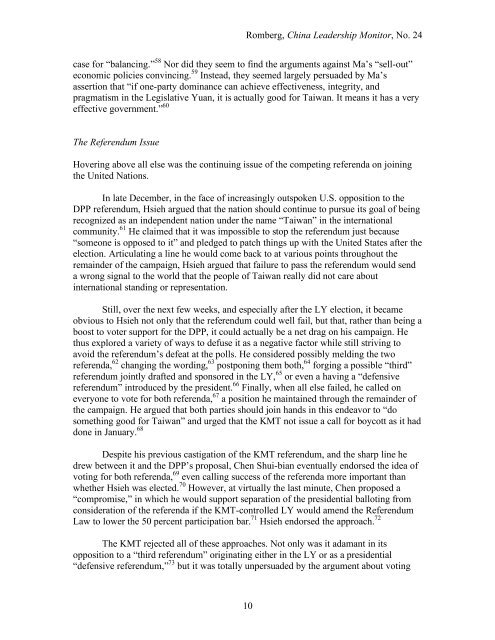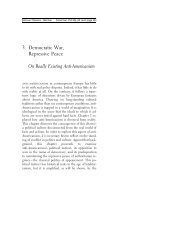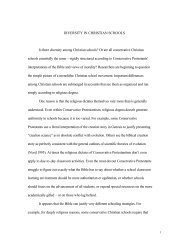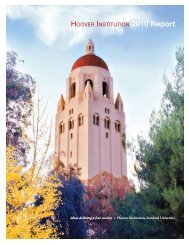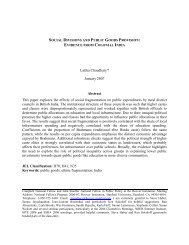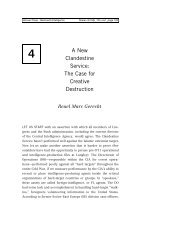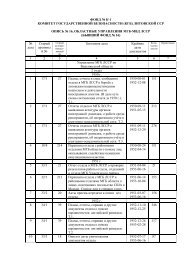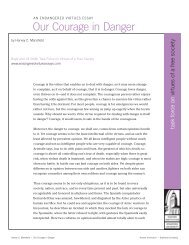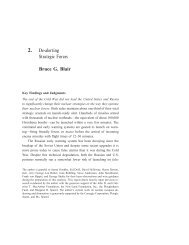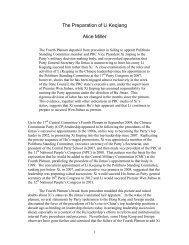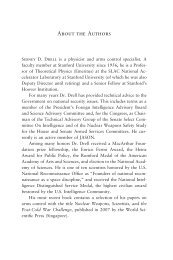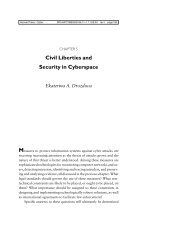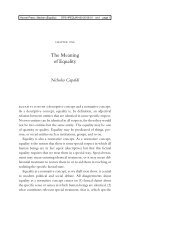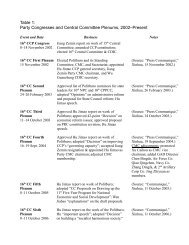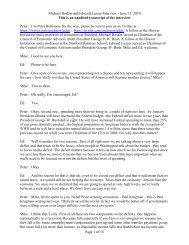Taiwan Elections: Foundation for the Future - Hoover Institution
Taiwan Elections: Foundation for the Future - Hoover Institution
Taiwan Elections: Foundation for the Future - Hoover Institution
You also want an ePaper? Increase the reach of your titles
YUMPU automatically turns print PDFs into web optimized ePapers that Google loves.
Romberg, China Leadership Monitor, No. 24<br />
case <strong>for</strong> “balancing.” 58 Nor did <strong>the</strong>y seem to find <strong>the</strong> arguments against Ma’s “sell-out”<br />
economic policies convincing. 59 Instead, <strong>the</strong>y seemed largely persuaded by Ma’s<br />
assertion that “if one-party dominance can achieve effectiveness, integrity, and<br />
pragmatism in <strong>the</strong> Legislative Yuan, it is actually good <strong>for</strong> <strong>Taiwan</strong>. It means it has a very<br />
effective government.” 60<br />
The Referendum Issue<br />
Hovering above all else was <strong>the</strong> continuing issue of <strong>the</strong> competing referenda on joining<br />
<strong>the</strong> United Nations.<br />
In late December, in <strong>the</strong> face of increasingly outspoken U.S. opposition to <strong>the</strong><br />
DPP referendum, Hsieh argued that <strong>the</strong> nation should continue to pursue its goal of being<br />
recognized as an independent nation under <strong>the</strong> name “<strong>Taiwan</strong>” in <strong>the</strong> international<br />
community. 61 He claimed that it was impossible to stop <strong>the</strong> referendum just because<br />
“someone is opposed to it” and pledged to patch things up with <strong>the</strong> United States after <strong>the</strong><br />
election. Articulating a line he would come back to at various points throughout <strong>the</strong><br />
remainder of <strong>the</strong> campaign, Hsieh argued that failure to pass <strong>the</strong> referendum would send<br />
a wrong signal to <strong>the</strong> world that <strong>the</strong> people of <strong>Taiwan</strong> really did not care about<br />
international standing or representation.<br />
Still, over <strong>the</strong> next few weeks, and especially after <strong>the</strong> LY election, it became<br />
obvious to Hsieh not only that <strong>the</strong> referendum could well fail, but that, ra<strong>the</strong>r than being a<br />
boost to voter support <strong>for</strong> <strong>the</strong> DPP, it could actually be a net drag on his campaign. He<br />
thus explored a variety of ways to defuse it as a negative factor while still striving to<br />
avoid <strong>the</strong> referendum’s defeat at <strong>the</strong> polls. He considered possibly melding <strong>the</strong> two<br />
referenda, 62 changing <strong>the</strong> wording, 63 postponing <strong>the</strong>m both, 64 <strong>for</strong>ging a possible “third”<br />
referendum jointly drafted and sponsored in <strong>the</strong> LY, 65 or even a having a “defensive<br />
referendum” introduced by <strong>the</strong> president. 66 Finally, when all else failed, he called on<br />
everyone to vote <strong>for</strong> both referenda, 67 a position he maintained through <strong>the</strong> remainder of<br />
<strong>the</strong> campaign. He argued that both parties should join hands in this endeavor to “do<br />
something good <strong>for</strong> <strong>Taiwan</strong>” and urged that <strong>the</strong> KMT not issue a call <strong>for</strong> boycott as it had<br />
done in January. 68<br />
Despite his previous castigation of <strong>the</strong> KMT referendum, and <strong>the</strong> sharp line he<br />
drew between it and <strong>the</strong> DPP’s proposal, Chen Shui-bian eventually endorsed <strong>the</strong> idea of<br />
voting <strong>for</strong> both referenda, 69 even calling success of <strong>the</strong> referenda more important than<br />
whe<strong>the</strong>r Hsieh was elected. 70 However, at virtually <strong>the</strong> last minute, Chen proposed a<br />
“compromise,” in which he would support separation of <strong>the</strong> presidential balloting from<br />
consideration of <strong>the</strong> referenda if <strong>the</strong> KMT-controlled LY would amend <strong>the</strong> Referendum<br />
Law to lower <strong>the</strong> 50 percent participation bar. 71 Hsieh endorsed <strong>the</strong> approach. 72<br />
The KMT rejected all of <strong>the</strong>se approaches. Not only was it adamant in its<br />
opposition to a “third referendum” originating ei<strong>the</strong>r in <strong>the</strong> LY or as a presidential<br />
“defensive referendum,” 73 but it was totally unpersuaded by <strong>the</strong> argument about voting<br />
10


